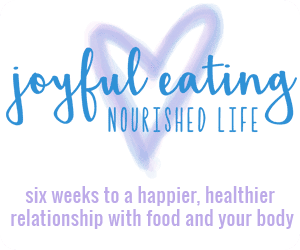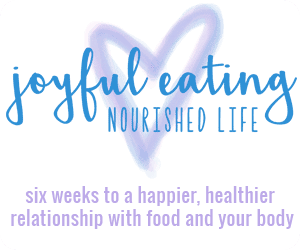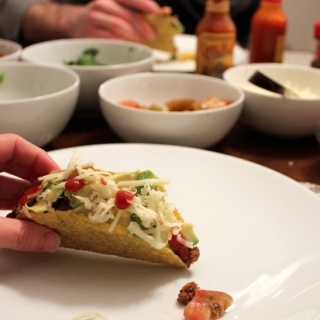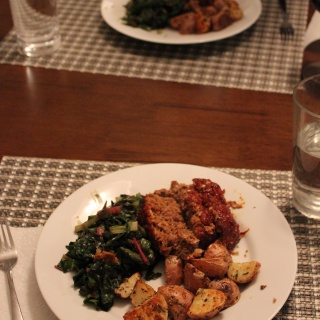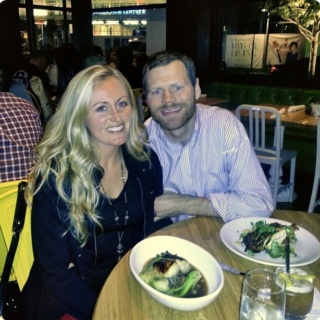As you guys know, earlier this year I created a virtual intuitive and mindful eating group program entitled Joyful Eating, Nourished Life with two fellow dietitians, Rachael and Alex. We ran our first 6 week session in June after spending the better part of a year creating the program. Our goal? Helping people move away from the diet approach to embrace a kinder, more natural form of eating that doesn’t involve guilt and restriction. Basically, we wanted to help people approach food in a way that was joyful, not fearful.
Our next 6 week session will launch on October 10, and we’ve spent the past couple months implementing feedback from our June participants to make the program even better. We’re adding three group Facebook Live videos to the program (one hosted by each of us dietitians) for additional support and Q&A ability – and we will include an anonymous question submission option for those that are shy about sharing their questions openly. We’re also scaling up our content around emotional eating, adding more actionable worksheets to help with understanding the reasons behind emotional eating – and how to stop it. For those of you reading that participated in the June program – don’t worry! We’re sharing these additional materials and hosting separate Facebook Live videos with you as well – more details to come via email. 🙂 Anytime we add materials to the program, we will make sure past participants get them too!
In addition to the helpful constructive feedback we’ve been acting on, we also received some wonderful testimonials from our June participants, including some people that were open to sharing their full stories on our blogs to encourage others to participate in future sessions of the program. Today, I’m sharing a Q&A with Cathy W., who participated in our June program.
Without further ado – here is Cathy’s story.
How Cathy Changed Her Relationship with Food
Tell us more about your history with food and dieting.
Food has always had some control over me. Even as a kid, I remember scarfing down dessert so I could have a second helping without taking the time to enjoy the first. I’ve always loved dessert, especially baked goods! My mom taught me to clean my plate, so I grew up thinking I was done when the food was gone, not when my stomach was satisfied. Boy, is the Clean Plate Club a hard habit to break!
Generally I don’t purchase processed foods to eat at home, and I make most of our food from scratch. However, I don’t eat enough fruits and vegetables consistently. Also, we like to eat out and have always treated eating out as a “treat,” and so usually anything goes, and it’s generally not “healthy.” Now I think this is fine on occasion, but we ate like this a lot.
I watched my mom diet, or try to diet, or talk about dieting my whole life, and while I’ve kept up with different diet trends, I haven’t followed them because it never made sense to me to cut out whole food groups or eat strictly all week just to have a cheat day on the weekend. “Clean Eating” is the only thing I really tried, and although I did lose weight eating that way, it didn’t work in the long run because, well, I like baked goods.
Other than “Clean Eating,” I have tried counting calories and staying in whatever range I was told by whatever program to stay in. Never worked. It was too tedious to keep track of every calorie, and I was too obsessive not to track every calorie. Between weighing and measuring the food and tracking each calorie, I’d quit when life got busy and then say, “I’ll start again on Monday,” so the cycle would just start again (or not). As the years went on, I tracked calories less and less because I realized it was not a sustainable approach to living a healthy lifestyle.
How did you try to control your eating in the past, before joining Joyful Eating, Nourished Life? What was the outcome?
I think “Clean Eating” especially gave me the notion of “good” and “bad” foods. I dealt with this by allowing splurging when eating outside of my home, which isn’t a good solution because it never helped me learn to have a positive relationship with food. Food was still in control.
What motivated you to join Joyful Eating, Nourished Life?
I have heard of Intuitive Eating for years and have read articles that discuss the general idea of eating this way. While it was the only eating advice that really made sense to me, most articles don’t go far enough to really teach someone who has always eaten fast and was taught to clean her plate HOW to actually eat intuitively.
However, about a year ago, I saw an article on Anne’s blog (note from Anne – here’s the post: How to Eat Intuitively – A Guide to Mindful Eating) about Intuitive Eating that included some book recommendations. So, I read the books, and they helped quite a bit, but when I learned about Joyful Eating, Nourished Life, I knew I HAD to join in because being a part of something interactive really appealed to me. I knew it would help me in my Intuitive Eating journey (and boy, did it!).
What’s the greatest lesson you learned from the program?
I learned so much… but probably the greatest lesson is that I do, in fact have control over food.
What was your first “a-ha moment” in Joyful Eating?
I was ecstatic to learn within the first couple of weeks of the program that when I eat when I’m hungry, and stop when I’m satisfied or just slightly full, that it’s much easier to make healthy choices, that I don’t get many cravings for sugar (even baked goods!), and that when I do splurge I don’t feel guilty because I am in control.
Looking back, how have you changed since completing Joyful Eating?
I feel lighter. I don’t mean that I weigh less because I don’t have any idea – I haven’t weighed myself. But, it’s incredible how much lighter I feel now that I’ve let go of the guilt associated with eating and food. I also have a more positive relationship with my body and I feel this has led to more confidence and happiness.
What’s one piece of advice you’d give to future Joyful Eaters?
One of the best things about learning to eat intuitively, especially through Joyful Eating, Nourished Life, is that there is no focus on perfection. There are no mistakes, only learning experiences. For me, this meant never having to wait until Monday to start again, I just try again every time I start to feel hungry. So, my advice is, “Just keep trying.”
Is there anything else you’d like to mention?
I was sold on this program when I saw it was about learning to have a positive relationship with food and your body. Joyful Eating, Nourished Life did that for me, and it is one of the greatest life lessons for anyone.
– Cathy W.
—
Thank you so much for sharing with us, Cathy – and for taking a chance on our program! We’re thrilled that Joyful Eating, Nourished Life had such a positive impact on your relationship with food and your body. We’re looking forward to continuing to support you on your intuitive and mindful eating journey in the alumni Facebook group!
If Cathy’s story resonates with you, we hope you will join us for the October session of Joyful Eating, Nourished Life. There is a happier way to live than yo yo dieting – let us show you how!
More praise for Joyful Eating, Nourished Life:
- “This program accomplished what another program and many books on intuitive eating could not, a positive relationship with food. Thank you.” – Jill C.
- “[Through this program,] I learned to slow down and really listen to my body’s hunger and fullness cues. Being more mindful in my food choices and allowing myself to eat or stop eating was a revelation. After years of shaming myself for wanting a snack and making poor choices as a result, it felt good to honor my hunger and fullness and actually listen to what my body really wants.” – Vanessa
- “I no longer judge myself for what I eat and have become reacquainted with hunger/fullness sensations.”
- “I loved this program. I loved the breakdown of lessons and how the program challenged me to learn about my body and love myself, which has been my greatest struggle with my body and eating. I feel this program has given me the tools to eat more healthily, enjoy the journey and pass that information and attitude to my daughter so she hopefully does not struggle in the same ways I have.” – K.S.


